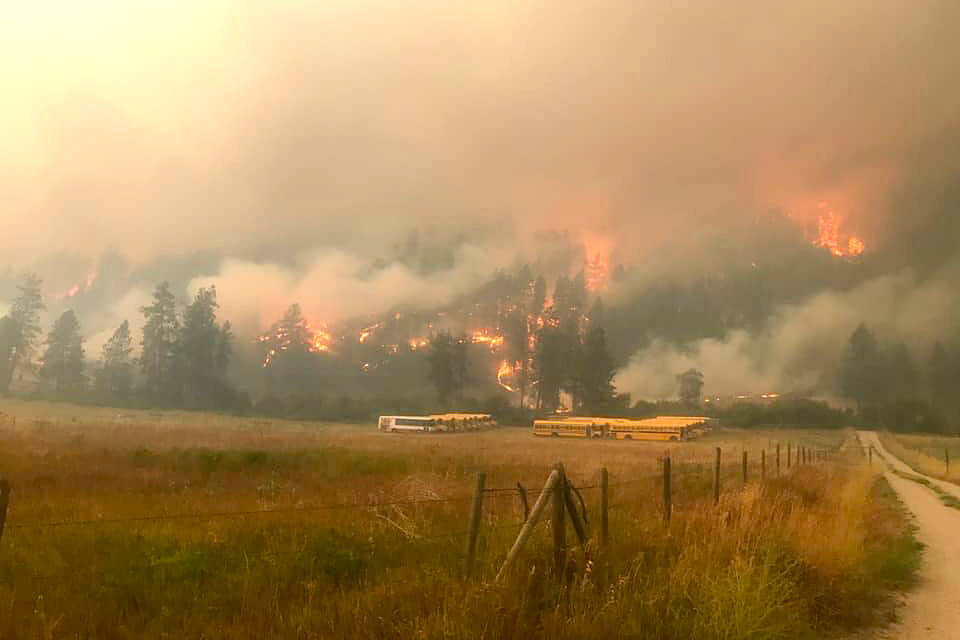By Jessica Wallace, Kamloops This Week
Did resources sit idle as fires ravaged the Interior this summer?
On Thursday, Oct. 21, Thompson-Nicola Regional District politicians met with the BC Wildfire Service and the associate deputy forests minister, Eamon O’Donoghue, and raised issues related to the wildfire season.
TNRD director and Kamloops Coun. Mike O’Reilly said contractors sat idle with crews ready to help, but were not given the go-ahead to fight fires. TNRD chair Ken Gillis said he received emails from companies as far away as Saskatchewan offering innovation to tackle the blazes. However, he said, they indicated to him they could not get the BC Wildfire Service to respond to calls.
Area E (Bonaparte Plateau) director Sally Watson, meanwhile, questioned the use of structural protection units in Monte Lake, which lost many structures to the White Rock Lake fire.
BC Wildfire Service executive director Ian Meier said the organization is not standing around waiting for something to change, noting the organization is looking internally and making changes as it needs to, including constant review of, and shifting toward, recommendations outlined in a review by George Abbott and Maureen Chapman following the 2017 wildfires.
Watson, however, indicated frustration on behalf of the TNRD.
Gillis said a rancher constituent told him policy change by the forests ministry in recent years led to logging byproduct scattered on land, when it had previously been burnt.
“He said, once the fire gets into that, it takes off through it,” Gillis said. “It just welcomes all that trash on the ground. It takes off through it and, by the time it gets to the standing timber, it builds up a head of steam that nobody’s going to stop. I’m wondering if there is any move contemplated to revisit that question and get that material picked up off the ground because, obviously, it’s causing a great problem.”
O’Donoghue said the concern is warranted and it is indeed happening, but he noted change is coming. He said it is about striking a balance between reducing wildfire risk and allowing secondary industries to utilize the leftover waste, discussions he said are ongoing.
O’Donoghue said the ministry is also looking at increasing the number prescribed burns and penalties for industries that leave waste behind.
When it comes to logging on private land, O’Donoghue said the province needs to incentivize private landowners to clean up their land.
Read more: Column: Wildfires almost out of sight, but not out of mind
Read more: Column: Wildfires front and centre for municipalities
In addition, O’Donoghue indicated the ministry is in the middle of drafting a Treasury Board submission to increase resources and budgets for wildfire risk prevention and fire-smarting for communities.
He said the goal is to have other communities emulate the fire-smarting work done in Logan Lake, a years-long effort that helped save the town from the Tremont Creek fire this past summer.
“Our minister and the premier, as you know, went to Logan Lake to look at the activity there and really saw the difference that made,” O’Donoghue said.
In addressing concerns about underutilization of community resources, Meier said it comes down to relationships, ones he said should be established in advance of fire season. He said there is risk and liability to be considered, noting a happy medium needs to be found. Meier said he has seen communities united during a fire, but later ripped apart when the smoke clears.
Area P (Rivers and the Peaks) director Mel Rothenburger suggested a model out of Australia, where people are given the opportunity to leave early or stay behind and defend property. Rothenburger said it could reduce the need for mass evacuations. Nearly 300 evacuation orders and alerts were issued by the TNRD’s emergency operations centre during the 2021 fire season.
O’Reilly, meanwhile, said the TNRD is missing an opportunity for its politicians to sit down with elected officials from area First Nations. During an Oct. 20 community to community forum between the City of Kamloops and Tk’emlúps te Secwe̓pemc, a Tk’emlúps councillor expressed concern about having first-time phone calls with the city, Emergency Management BC and the TNRD during the fires.
“I think it’s a very big gap,” O’Reilly said, noting First Nations have large land masses. He called for First Nations to have a seat at the TNRD’s emergency management committee.
Debate, meanwhile, continues over whether a declaration of a provincial state of emergency helped. Staff said it did not provide a huge change, but that, anecdotally, internal resources were freed up by the province.
Merritt Mayor Linda Brown said the declaration made a significant difference in her community, providing a tool to deter tourists and free up hotel rooms, while also reassuring residents they were supported by the province.
“In terms of community mindset, it had a tremendous great value to them,” Brown said.
newsroom@saobserver.net
Like us on Facebook and follow us on Twitter
Sign up for our newsletter to get Salmon Arm stories in your inbox every morning.

